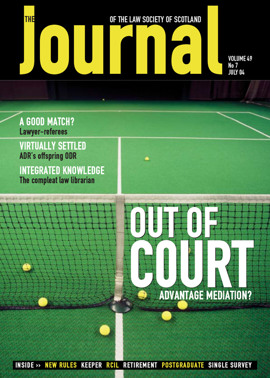White privilege: what should we do?
Many people have been moved to anger, sadness and empathetic exhaustion by the Black Lives Matter protests. The public grief and frustration of Black, Asian and minority ethnic (“BAME”) communities, following George Floyd’s death, have been a shock to our systems.
That said, there is no shock that racial prejudice remains in the Scottish legal profession. Many BAME lawyers have spoken eloquently about the overt and covert racist language and attitudes they still experience. The Law Society of Scotland reported systemic discrimination and racial prejudice in its 2018 Profile of the Profession. The lack of non-white members of the judiciary, the limited number of advocates of colour, and the distinction between the numbers of BAME law students and those who enter our profession, demonstrate a truth that is uncomfortable to those who believe racism is history.
Racism is woven into our legal system. It is more than the lack of BAME individuals in the profession. Institutional racism enforces barriers for BAME communities. This was defined in the Macpherson report (the Stephen Lawrence Inquiry) as: “the collective failure of an organisation to provide an appropriate and professional service to people because of their colour, culture or ethnic origin. It can be seen or detected in processes, attitudes, and behaviours which amount to discrimination through unwitting prejudice, ignorance, thoughtlessness and racist stereotyping which disadvantages minority ethnic people”.
An example, from the Scottish judiciary's Equal Treatment Bench Book, is that “a lawyer may also be asked to remove a veil or some other head covering if the circumstances suggest that the interests of justice are being impeded, for example, if the lawyer’s voice cannot be clearly heard”. In the era of nanotechnology and smart communication, it is preferred that a woman with a veil, who statistically will be a woman of a BAME background, should compromise her identity rather than that the court system be updated. Setting aside the personal dilemma for the lawyer wearing a niqab, having such guidance can have the effect of dissuading Muslim women from seeking a fully manifested career in law, or a career at all, realising the phrase “You can't be what you can't see.”
Professional obligations
Such institutional racism contradicts that equality and diversity are central to the development of a modern profession, as promoted by the Law Society of Scotland. Trust and personal integrity, and diversity, are fundamental principles in the 2011 Practice Rules: solicitors “must not discriminate” (Standards of Conduct, B1.15.1), and must have an appropriate awareness and understanding of the issues surrounding equal opportunities, unlawful discrimination, equality and diversity (B1.15.2(c)). Failure to comply may be treated as a professional misconduct or unsatisfactory professional conduct.
One may believe that the Black Lives Matter movement is a moral debate for civic society; however it cannot be clearer that ensuring fairness and equal opportunity is a legal obligation for any practising solicitor. It is our duty to use our legal privilege, and for white solicitors their white privilege, to activate equality at every level, in every email, in every boardroom, in every traineeship interview, and in every tribunal.
Aside from our legal and moral obligations, cumulative research has evidenced that maintaining a focus on equality makes good business sense. This derives not only from more efficient use of human capital (particularly of women), bringing increased innovation and good corporate governance, but also by enhancing firms’ abilities to market to underrepresented minorities and communities. Companies that harness the benefits of diversity and inclusion can gain competitive advantages in the coming economic downturn. Equality in hard times is more important than ever.
Call to action
The first way to promote diversity is to celebrate it. Firms are now more likely to celebrate LGBT+ Pride events, as well as LGBT+ culture, arts, ideas and concepts. The Society's recent LGBT+ campaign for #PrideInside had a simple message: We are here. We see you. You matter to us. We are so happy that you are here. There is no reason why our BAME people, culture, spaces, and ideas cannot be similarly celebrated, whether during Black History Month, Eid, Ramadan, Passover or throughout the year. There is no politics in telling people they are valued and welcomed, regardless of their background, ethnicity, gender identity, religion or sexual orientation.
It is time for white solicitors not to be silent but instead to develop and implement ways to be anti-racist and pro-inclusion.
- While we adjust to a new normal post-COVID-19, we have the opportunity to redesign how we all do business, and not be silent in the face of racism and inequality. There are measurable, cost-effective and simple ways to do this, so we must ask our firms and organisations to:
- ensure that all staff undertake equality and diversity training, including unconscious bias training;
- promote LGBT+ Pride and inclusion by publicly committing to The Glass Network’s free inclusive framework, The Glass Charter;
- make an external statement promoting equal opportunities policies, including anonymous and gender-neutral recruitment;
- ensure that non-white faces appear in posts on social media and press releases;
- form a corporate social responsibility committee that inclusively represents everyone in the organisation, with the aim of supporting ethically-oriented practices and volunteer opportunities;
- communicate these values to all staff, and ask for their feedback, so organisational values reflect the organisation.
Practising solicitors must use their privilege as members of an institutional profession, and white members must use their privilege as beneficiaries of institutional racism, to implement the values of our evolving profession, one that is for all of us.
Because BAME lawyers matter.
Because Black Lives Matter.






